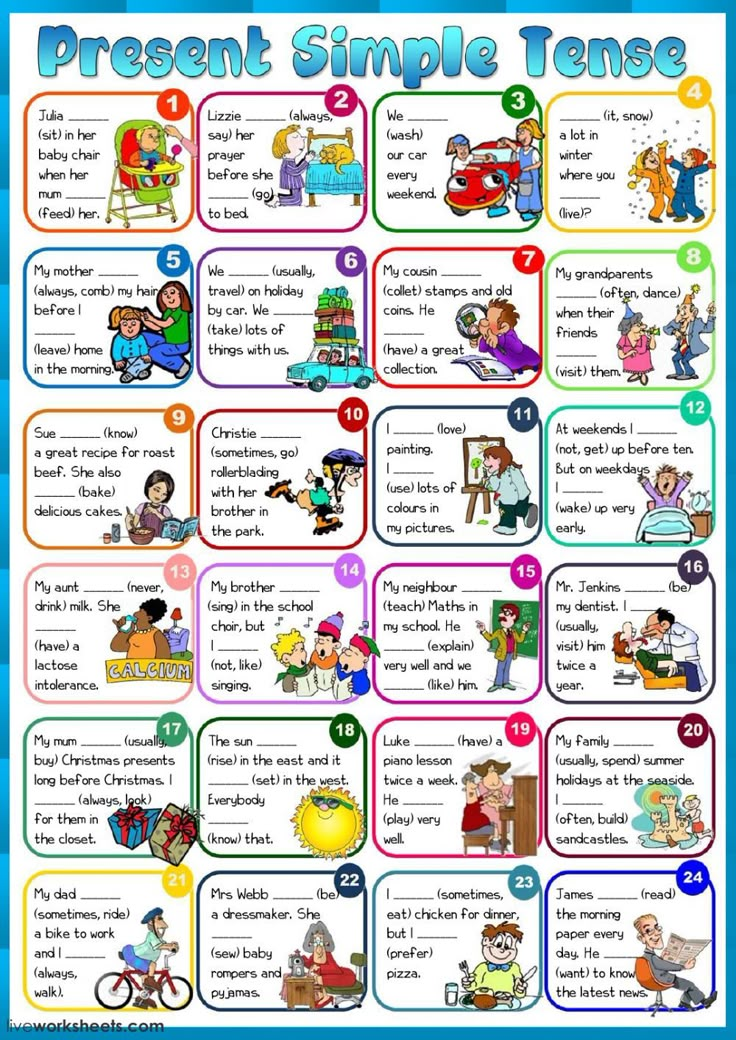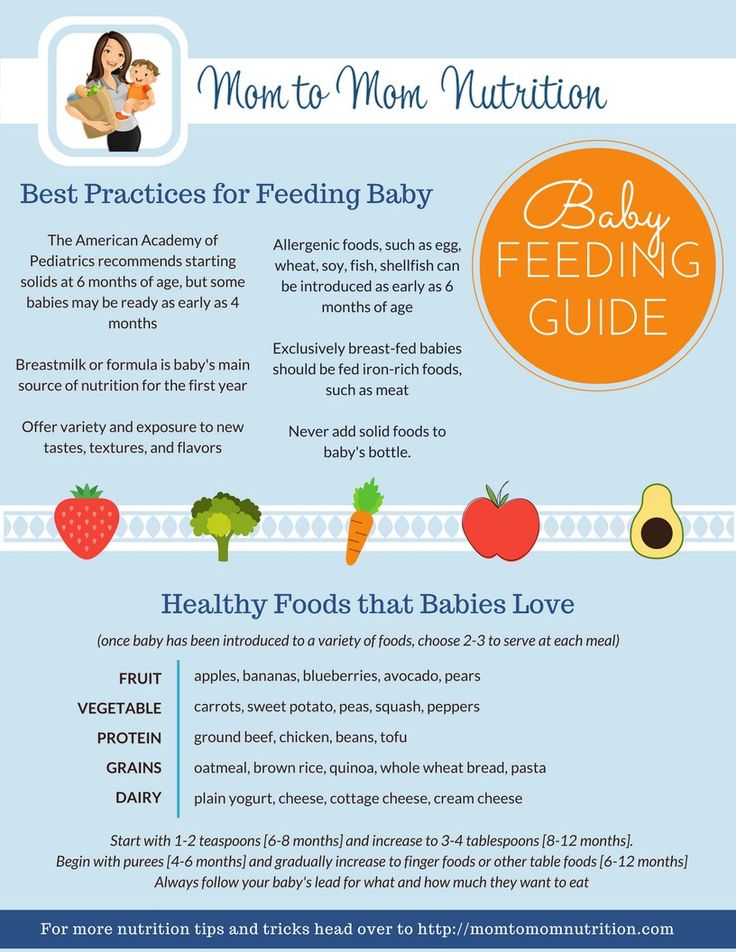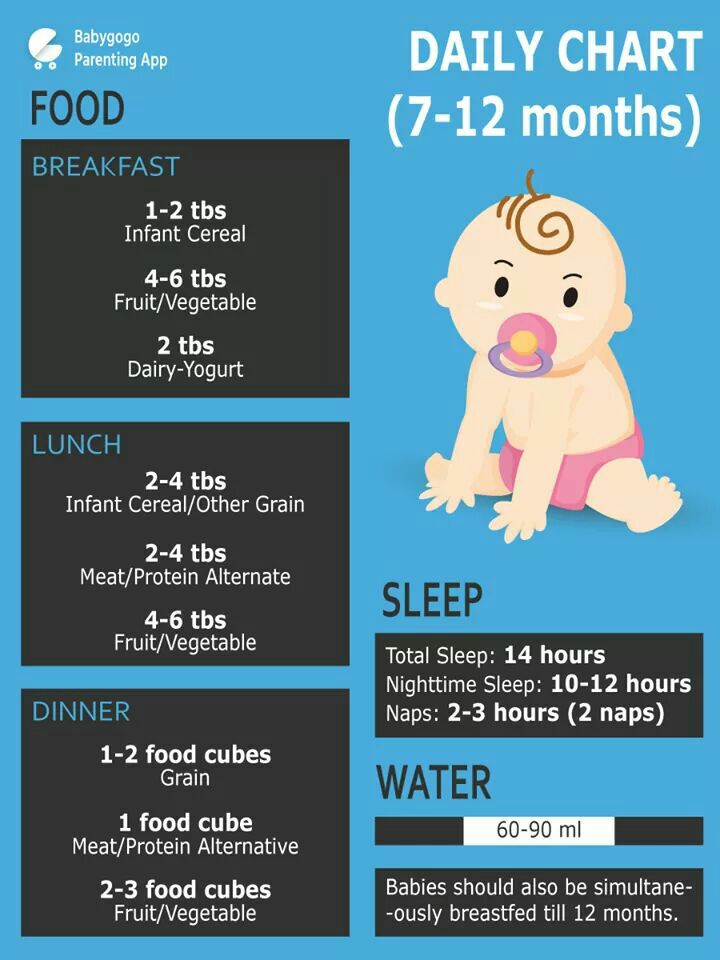Baby night feed
Our top 10 tips for night feeds!
Once you’ve got a baby, your nights will never be the same again! Certainly in the first few months, or until your baby is established on solids, you can expect to be getting up at night to feed your wee one. Some babies can simply feed then go straight back to sleep, however, some can wake up and then stay awake for several hours in the middle of the night or be very difficult to settle back to sleep again! The way you approach night wakes/feeds can have a real effect on your baby’s ability to stay in the "zone" for sleep.
In this article, we're sharing our top 10 tips to make this whole overnight experience a lot more manageable for both you and your baby.
Get your little one’s sleep back on track.
Get guidance, advice & exclusive support through the sleep regressions, nap transitions and big sleep changes to come.
Join Now
1. LISTEN FIRST
Babies (and especially newborns) can be very noisy sleepers! They grunt, wiggle, snort and whimper in their sleep. If you wake to your baby making noises, don’t leap out of bed right away - listen to see if they’re simply snuffling in their sleep!
Many times we jump up to our babies’ every noise and end up disturbing their sleep accidentally. Unless your baby is crying, just listen first to see if they need you to tend to them or if they’re just doing a little wiggle between sleep cycles.
2. LIGHTS OFF
When tending to your baby in the night, keep the lights off. If you need some light to see what you're doing, use a red nightlight, the light from your phone or let a little light from the hallway spill into the room. Exposure to light during night-time hours will signal to your baby’s body clock that it is daytime and they’ll want to stay awake!
Definitely do not watch TV while doing night feeds as the light from TVs is a blue-based light and this can interfere with both your and your baby's melatonin production, making it harder to go back to sleep.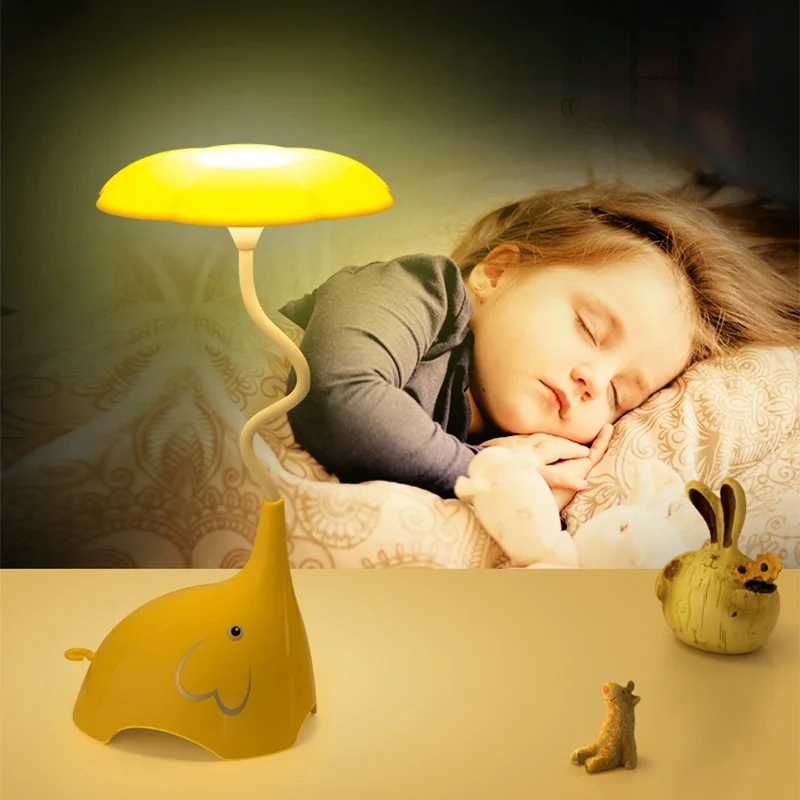
3. KEEP IT LOUD
We recommend using white noise all night long to help your baby settle and sleep, so definitely keep the white noise going while you’re feeding your baby! This continuation of their “sleep noise” will ensure they remain sleepy and in the right zone to go right back to sleep after their feed.
4. AVOID DIAPER CHANGES
Only change your baby’s diaper if it is necessary, not just because they’ve woken. Babies can usually go several hours without a diaper change, even if they have a milk feed, and changing their diaper can really stimulate them and make it hard for them to settle back to sleep!
If you do need to do a diaper change, the best time to do this is before you feed, or mid-feed, so your baby still has the rest of the feed to get nice and sleepy again. Changing a diaper mid-feed is also a good option for younger babies who might be too sleepy to take a decent feed. A diaper change can help to wake them up just enough to finish the feed.
5. KEEP THEM COZY
If your baby is swaddled, keep them swaddled throughout their night feeds. Or if your baby is older, keep them in their sleeping bag. If you need to do a diaper change before or during their feed, re-swaddle them again or put them back in their sleeping bag as soon as they are changed. This makes it easy to simply pop your baby back in their bed after feeding and winding them.
6. WIND YOUR BABY WELL
Babies definitely need to burp after each feed. Even at night. If your baby falls asleep while feeding or is put back to bed without a decent burp escaping, it can cause them to wake again 15-20 minutes later or it can mean they don't settle easily back to sleep. Wind is a major culprit of waking in the early morning hours!
If you're trying to wind your baby and they are not releasing a burp, keep trying! I guarantee there is one there and it could well be the cause of their unsettled night. In our Little Ones App, we share further tips and a video tutorial for winding your baby.
7. MINIMAL STIMULATION
Try to avoid too much stimulation with your baby in the night - they need to learn that the night is for sleeping! Often day and night confusion occurs in newborn babies and this is exacerbated by lots of communication or stimulation in the night. Newborns get stimulated very easily, even the sound of a voice is enough to stimulate them and they will wake up fully to check out this new sound. Your baby doesn’t need games or tickles in the middle of the night - save this for during the day when you want to keep them awake!
8. LOOK AFTER YOURSELF
If you are breastfeeding, make sure you’re drinking water when you’re up feeding during the night - it’s thirsty work! Keep a water bottle by your feeding chair in baby’s room so you don't forget. If you need to have a snack in the night, try not to choose something with too much sugar in it or it might keep you awake. A banana is a really good choice because bananas contain the enzyme tryptophan which actually helps with sleep!
A banana is a really good choice because bananas contain the enzyme tryptophan which actually helps with sleep!
9. READ OR LISTEN
It can take a while for a very young baby to feed in the night, so be prepared! Have a good book on your phone, iPad or kindle so you can read it while you’re feeding. This gives you a bit of relaxation and time-out too and will make the hours of feeding feel like less of a chore. You could also listen to music or podcasts through headphones while feeding in the night. Keeping yourself relaxed will benefit your mood and also make it easier for you to fall back asleep again.
10. TAKE A CLOSER LOOK AT YOUR BABY'S SLEEP
If your baby is waking very frequently overnight and/or staying away for long periods, it might pay to have a closer look at what's happening in their day, as this sort of waking pattern can indicate a baby is over or under tired. Some simple tweaks to your baby's day time sleep may be all that's needed to reduce their overnight waking.
If your baby is over 4 months and waking every 2 hours overnight, this might indicate they are waking simply to be "put" back to sleep by feeding. Read more about this here.
We know how exhausting it can be getting up night after night but this time alone with your baby, in the quiet hours of the night, can also be really special. There will come a time when your baby no longer needs you to help them back to sleep and when that happens, you will probably feel relieved at first (after all, it means more sleep!) but don't be surprised if, one day, you find yourself feeling a little bit wistful too.
And remember, if you are struggling with your baby's overnight wakes, we're here to help. Our Little Ones App provides you with all of the information and tools you need to improve your baby's sleep and our certified sleep consultants are available to chat to at any time of the day or night.
------------
Baby Night Feedings By Age
Home / Sleep Training / Baby Night Feedings By Age – An Easy Reference Chart from The Baby Sleep Site®
by Emily DeJeu in Sleep Training —
If your baby is waking at night to eat a lot, you might naturally start asking if they are actually hungry. How many baby night feedings by age are appropriate? Here are common questions:
“How many times should be my baby be eating at night?”
“Is it time for me to night-wean, or are his night feedings still necessary?”
“I feel like my baby is up all night eating – is this normal?!”
These are questions we hear just about every day around here – and we thought it was high time we gave you a new resource to help you answer questions like these! But this isn’t just any regular blog article – no, today, we’re bringing you another awesome chart!. A few months ago, we brought you a baby/toddler bedtime by age chart, and your response was overwhelming – that’s now one of the most popular articles on our site!
So, since it’s clear you love reference charts (and we don’t blame you!), how about another one? This time, we’re taking a look at night feedings by age. What’s the standard at each age? How does “standard” vary based on whether you breastfeed or bottle-feed? Is your baby feeding too much for her age, or are her night feedings in line with what healthcare providers consider normal? Read on and find out so you can decide when night weaning may be appropriate!
What’s the standard at each age? How does “standard” vary based on whether you breastfeed or bottle-feed? Is your baby feeding too much for her age, or are her night feedings in line with what healthcare providers consider normal? Read on and find out so you can decide when night weaning may be appropriate!
The content of today’s chart was created by Miriam Chickering, who is a mom of 6, an experienced sleep and lactation consultant and a labor and delivery nurse with years of experience. So to say she knows a thing or two about baby feeding would be an understatement! Let’s take a look at what she advises are standard baby night feedings, broken down by age.
Baby Night Feedings By Age*| Age | Breastfed Totals Per Night** | Formula-Fed Totals Per Night** | Notes |
| 0-2 months | 3-5 feedings per night | 2-4 feedings per night | Remember, newborns need to eat around the clock – newborns should not go more than 4 hours between feedings (preferably no more than 3 hours). |
| 3-4 months | 3-4 feedings per night | 2-3 feedings per night | Watch out for the 4 month sleep regression – if your baby is suddenly more wakeful, it may have less to do with a need for food and more to do with changing sleep patterns! |
| 5-6 months | 1-3 feedings per night | 1-2 feedings per night | As you can see by the numbers, most babies are starting to consolidate their night feedings at this time, as well as consolidating their sleep. By this age, most babies are sleeping less during the day and getting one nice, long stretch of sleep at night. |
| 7-9 months | 0-3 feedings per night | 0-1 feeding(s) per night | We find that most formula-fed babies are done feeding at night by this point, or are starting to night-wean. We usually recommend for ALL babies (both breast and bottle) an attempt at night-weaning here, if you feel comfortable with it. We usually recommend for ALL babies (both breast and bottle) an attempt at night-weaning here, if you feel comfortable with it. |
| 10-12 months | 0-2 feedings per night | 0-1 feeding(s) per night | Formula-fed babies are almost always done feeding by 12 months. If your breaastfed baby is still feeding at night by 10 or 11 months, this is perfectly fine – but try to consolidate it to one feeding, if possible. |
*These night feedings are considered standard, but they also assume that baby is healthy, is gaining weight properly, has no food allergies or medical concerns, etc. What’s normal for your baby may look a bit different, based on unique factors. As always, if you have doubts about your baby’s feeding patterns, please speak with your healthcare provider, as they are the best resource for feeding concerns.
**”Night” in this chart refers to a 12-hour period of time.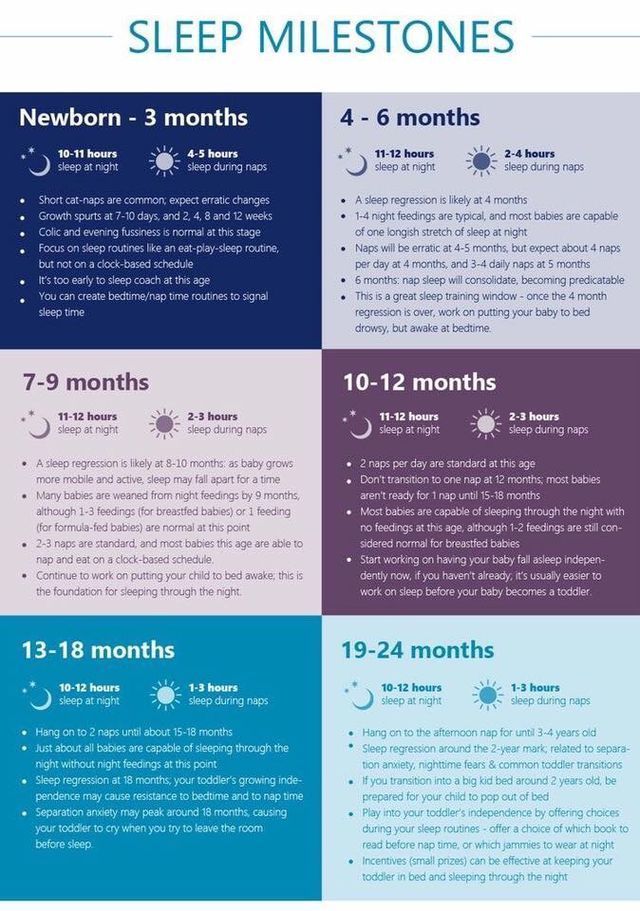
Does this chart give you some encouragement? I hope so – look at those wide ranges of what’s considered normal and standard!
What About Toddlers?
Now, we don’t get into toddler territory with this chart, simply because the vast majority of toddlers do not need to feed at night in order to grow properly. While breast milk and formula are still great for toddlers to consume, they can generally get what they need during daylight hours.
For even more night weaning and night feeding resources, check out these special members-only resources in our VIP members Area:
- The 3-Step System To Better Baby Sleep (members enjoy unlimited access to this e-book)
- Night-Weaning Mini-Action Plan (MAP™) (step-by-step action plan for VIPs to night-wean fast!)
- Night Weaning: How To and Common Pitfalls (tele-seminar featuring Nicole Johnson)
- Breastfeeding and Sleep Training (tele-seminar, featuring Miriam Chickering)
- How Fixed and Fluid Feeding Schedules Can Help You Night Wean (step-by-step night weaning plans)
- Is My Baby Ready To Night Wean? (quiz)
Need Night-Feeding Help From An Expert? Look No Further!
It’s all well and good to know what’s standard when it comes to night feedings – but what if your baby is far from the standard? Maybe your baby is up all night, and you know it’s not because she needs to eat.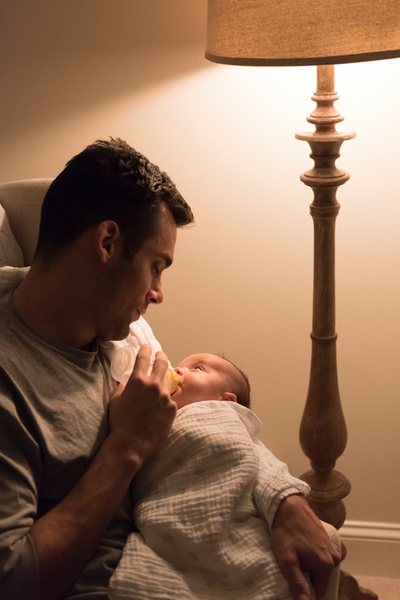 Or maybe your toddler is still waking to feed at night, even though you’re certain he could drop that 1 a.m. feeding. How can you help your baby or toddler sleep well while still ensuring that he’s getting enough nourishment at night? Our team of expert consultants can help you do just that! Connect with a consultant, and she’ll craft a customized sleep coaching plan, as well as a personalized day and night feeding schedule, just for your baby.
Or maybe your toddler is still waking to feed at night, even though you’re certain he could drop that 1 a.m. feeding. How can you help your baby or toddler sleep well while still ensuring that he’s getting enough nourishment at night? Our team of expert consultants can help you do just that! Connect with a consultant, and she’ll craft a customized sleep coaching plan, as well as a personalized day and night feeding schedule, just for your baby.
Browse our list of consultation package options here.
Once you make your choice and purchase, you will immediately receive an e-mail with your Helpdesk login information. You’ll be able to log in and start your Sleep History form right away – it’s that simple!
Want more information about how personalized help works? Check out our FAQ page here, and get answers.
The Baby Sleep Site® is a participant in the Amazon Services LLC Associates Program and other product affiliate programs. If you click on a product link and make a purchase, The Baby Sleep Site® may (but not always) receive a small commission from the company selling the product, but will not affect your purchase price. We only recommend products that we believe are quality products and are good for our readers.
We only recommend products that we believe are quality products and are good for our readers.
If you are tired of wading through stacks of baby sleep books that just aren't working, if you are beyond exhausted and just can't solve your child's sleep problems on your own...then personalized sleep consulting is for you. We have been around since 2008 and invite you to tap into our MANY years of experience. Our team of expert consultants will create a Personalized Sleep Plan® just for your family and then support you through every step of implementing your plan. We encourage you to consider our personalized, one-on-one baby and toddler sleep consultation packages if you want to see real, meaningful results now. Your consultation package also includes ample follow-up help, designed to help you troubleshoot problems and tweak your plan as needed.
Learn More About Services
For those persistent nighttime struggles, check out The 3 Step System to Help Your Baby Sleep. Using the same unique approach and practical tools for success, this e-book helps you and your baby sleep through the night.
Learn More About The 3-Step System
If you’re looking for ways to get your baby or toddler into a healthy sleeping routine during the day, explore Mastering Naps and Schedules, a comprehensive guide to napping routines, nap transitions, and all the other important “how-tos” of good baby sleep. With over 45 sample sleep schedules and worksheets, Mastering Naps and Schedules is a hands-on tool ideal for any parenting style.
Learn More About Mastering Naps
For those persistent toddler sleep struggles, check out The 5 Step System to Help Your Toddler Sleep. Using the same unique approach and practical tools for success, this e-book helps you and your toddler sleep through the night and enjoy a better daytime schedule.
Using the same unique approach and practical tools for success, this e-book helps you and your toddler sleep through the night and enjoy a better daytime schedule.
Learn More About The 5-Step System
Join our VIP Members Area packed with exclusive content and resources: e-Books, assessments, detailed case studies, expert advice, and more. As a VIP member, you'll also enjoy a weekly chat with an expert sleep consultant.
Learn More About VIP Membership
Since starting in 2008, we’ve gained over 10,000 comments on our blog!
At this time, we’ve turned the comment sections off. We would, of course, love to hear from you! For help with your specific sleep problems, please learn more about our DIY resources or our sleep consultation services. Or, consider emailing us for a fast and helpful response!
How to wean a child from night feeding, wean a child to eat at night
0-6 months
Article
5/5 2 reviews
A newborn baby eats at any time of the day, day or night. As the baby's digestive tract grows stronger, the interval between feedings gradually increases. Moms have a natural question: when and how should you stop night feedings so that the baby sleeps all night? nine0003
As the baby's digestive tract grows stronger, the interval between feedings gradually increases. Moms have a natural question: when and how should you stop night feedings so that the baby sleeps all night? nine0003
8 min. for reading Feb. 17, 2022
Contents
Should I feed my baby at night
How many nightly feeds does my baby need
- For breastfed babies, combination breastfeeders and babies with reflux
- Formula-fed babies
How to know if your child is ready to give up nighttime meals
How to wean a baby from night feedings: expert advice
FAQs
Resources
Is it necessary to feed a baby at night while taking care of the baby if you are chronically sleep deprived. But why can't a baby go without food at night?
In the first months, the baby does not have a clear regime, he still weakly distinguishes between day and night: during prenatal development, the baby is used to getting everything he needs from his mother at any time. And most importantly - at the beginning of life, the child grows very quickly and requires a lot of nutrients, while having a small stomach and a still fragile digestive system. For these reasons, the baby cannot go without food for a long time and requires food approximately every 2-3 hours, and pediatricians, in turn, insist on the need for nightly breastfeeding of a newborn. nine0003
And most importantly - at the beginning of life, the child grows very quickly and requires a lot of nutrients, while having a small stomach and a still fragile digestive system. For these reasons, the baby cannot go without food for a long time and requires food approximately every 2-3 hours, and pediatricians, in turn, insist on the need for nightly breastfeeding of a newborn. nine0003
Important!
Sleep and nutrition patterns, as well as the need for them, are individual for each child. Therefore, if it seems to you that the baby eats little and rarely, or vice versa - too often, consult with the doctor you are seeing.
In addition, night feedings, although they interfere with sleep, are useful not only for the child, but also for the mother. They help to properly establish lactation, because it is at night that the hormone prolactin is produced, which is responsible for the amount of breast milk. nine0003
Advice
With proper organization of night feedings, the baby eats half asleep and quickly falls asleep further.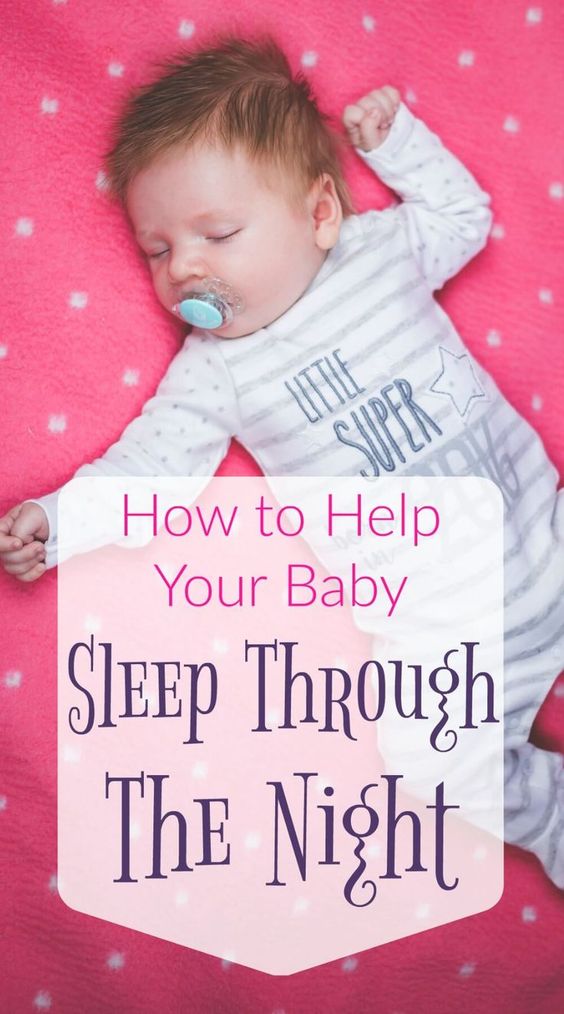 To do this, start a night light in the room and be ready to feed as soon as the baby wakes up. Sleep in comfortable nursing clothing if you are breastfeeding.
To do this, start a night light in the room and be ready to feed as soon as the baby wakes up. Sleep in comfortable nursing clothing if you are breastfeeding.
How many night feeds does a baby need
The smaller the child, the more often he needs to be fed. But over time, the digestive tract gets stronger, and the baby can eat more and endure longer breaks between meals. Below is an approximate number of night feedings, depending on the age of the baby:
1. For breastfed, mixed breastfed and reflux babies:
| Age | Number of night feedings |
| 0-3 months | breastfeeding on demand approximately every 2-3 hours |
| 3-4 months | 2-3 times as required or every 3-6 hours |
| 5-6 months | 1-2 meals |
| 7-9 months | 1, possibly 2 times |
| 10-12 months | sometimes 1 feeding |
| 12+ months | usually without night feedings |
Important!
During growth spurts, your baby should be fed as needed.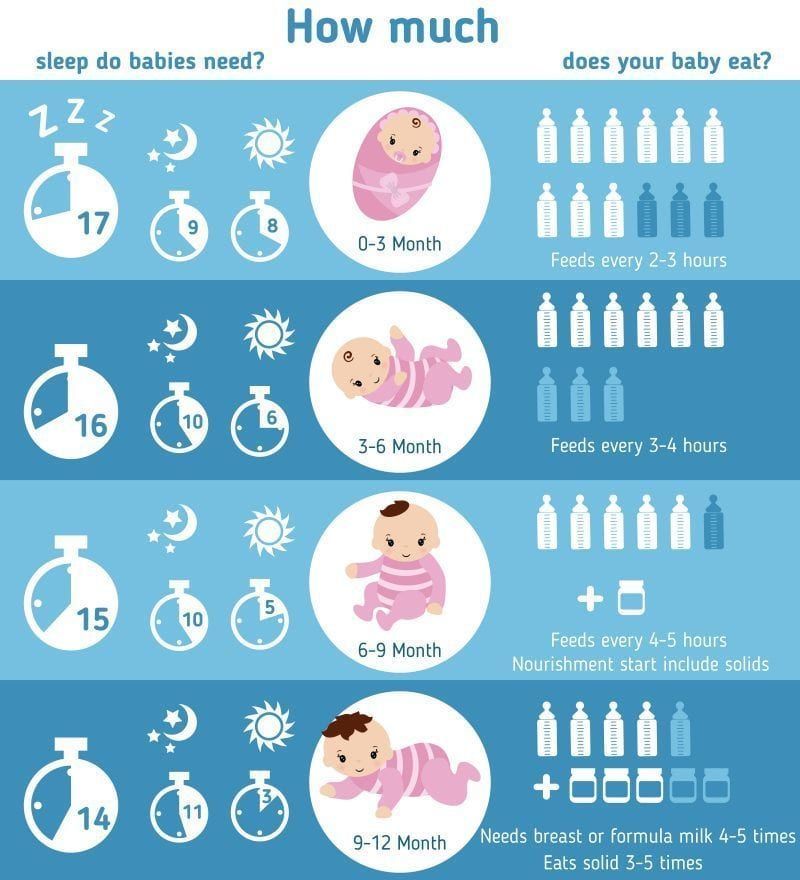 Such bursts occur approximately at 5, 8, 14, 19, 26, 37 and 46 weeks of life and last about 7 days.
Such bursts occur approximately at 5, 8, 14, 19, 26, 37 and 46 weeks of life and last about 7 days.
How do you know if your baby is ready to give up nighttime meals? After this period, the need for nightly meals depends on the pace of development, individual needs and the health of the child. If the baby was born prematurely or is not gaining weight well, experts recommend waking him up 3.5-4 hours after the previous feeding and offering the breast. nine0003
Advice
If you're not sure if your baby is ready to stop feeding at night, talk to your doctor. The specialist will help you understand and make the right decision based on the physical indicators of your child.
If the baby is healthy and has a good weight, somewhere between 4 and 6 months old, he will begin to get enough calories during the day so that he does not need to feed at night. In breastfed children, this process may be a little slower - up to 6–10 months [2].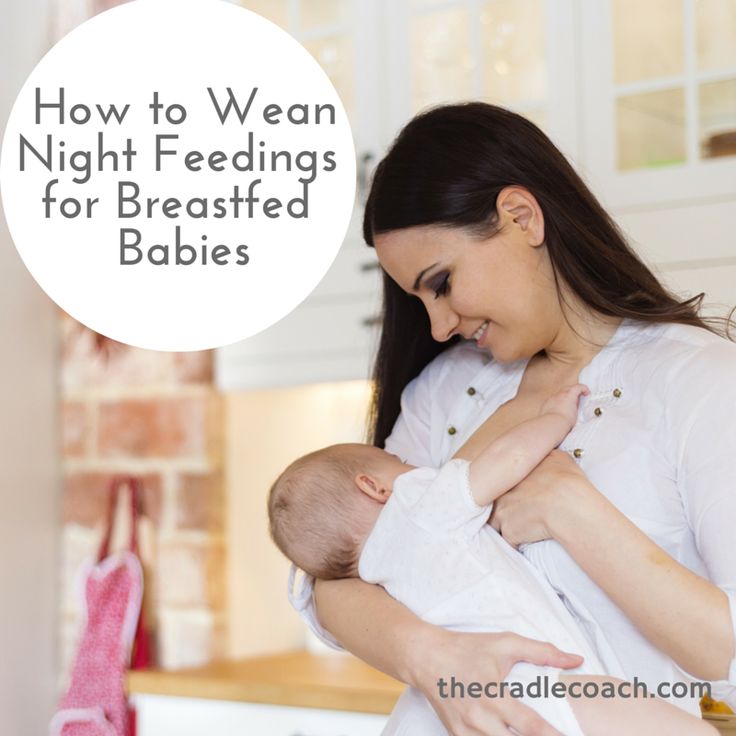 nine0003
nine0003
It is also important to take into account that the refusal of nighttime "snacking" occurs gradually: there are very few cases when a child stops eating at night and immediately starts sleeping 5-6 hours in a row. Usually, babies who are used to eating several times a night wake up out of habit, and it will take time to change this routine. First, the baby will ask for food half an hour later than usual, then an hour, a little later - two, and so on. Step by step, over several weeks, night sleep reaches 6-7 hours in a row. This joyful moment can come at 4 months or closer to 12 months: all babies are unique, and it's not scary or unusual for an infant to sleep much longer without food, while an older child keeps waking up to eat. nine0003
Advice
Dentists recommend abolishing nighttime feedings for children older than one year, as food leftovers in the mouth can damage baby teeth. This risk is minimal when breastfeeding.
Also, remember that your child has many other important needs. Perhaps he wakes up and calls you, not so much for food, but for comfort and closeness. What could be more reassuring and safer than the caring hands of parents who feed and cradle? feedings. nine0003
Perhaps he wakes up and calls you, not so much for food, but for comfort and closeness. What could be more reassuring and safer than the caring hands of parents who feed and cradle? feedings. nine0003
How to wean a child from night feeding: expert advice
Many parents are interested in how to properly wean a baby from eating at night so that it does not become a lot of stress for him. Especially if the baby stubbornly refuses to give up night feeding.
- Start the weaning process slowly and gradually. Slowly reduce your nightly breastfeeding time or give your baby less milk (mixture if formula-fed) from a sippy cup. Try to extend the intervals between
Important!
Under no circumstances should the issue of night feedings be turned into a battlefield. The “cry - stop - wean” method loosens the baby’s nervous system and can provoke severe stress.
- Make sure your child eats well during the day.
 Babies become more active as they get older, and if they get carried away playing or walking, they may skip meals or not eat enough and then try to make up for it at night. Therefore, take scheduled breaks during the day for "silent feeding" in a place where nothing will distract the crumbs from eating. nine0020
Babies become more active as they get older, and if they get carried away playing or walking, they may skip meals or not eat enough and then try to make up for it at night. Therefore, take scheduled breaks during the day for "silent feeding" in a place where nothing will distract the crumbs from eating. nine0020
Advice
If you're not sure if your child is eating enough, check their height by weighing them at the doctor's office.
- Try feeding your baby before bed. If a child goes to bed with a full tummy, they are less likely to wake up hungry in the middle of the night.
- Ask dad to get up at night with the baby. If an awakened baby hears your smell or the aroma of breast milk, this can provoke his appetite, even if the baby did not wake up because of hunger. If you sleep in the same room, it's best to move the crib to dad's side. nine0020
- Phase out feedings one at a time. When the baby wakes up to eat at night, go to him and reassure him, gently but firmly explain that now is the time to sleep, not eat.
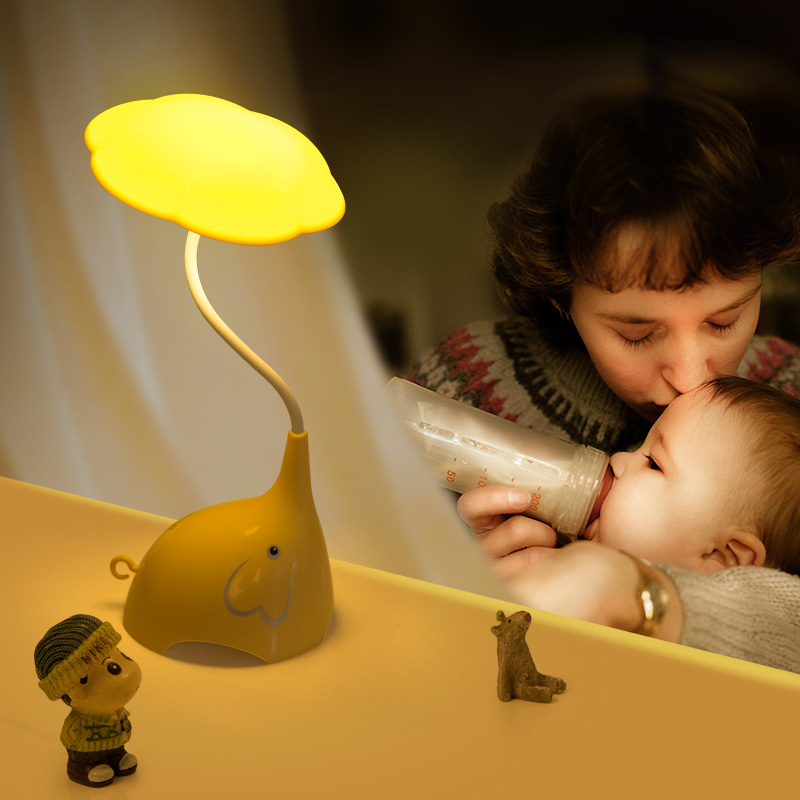 At the same time, pat and stroke the child on the back or tummy, but do not pick him up. Even if the baby does not yet understand your words, he gradually catches the meaning, and your presence and attention will be soothing to him.
At the same time, pat and stroke the child on the back or tummy, but do not pick him up. Even if the baby does not yet understand your words, he gradually catches the meaning, and your presence and attention will be soothing to him. - Try giving your baby water to drink. Babies may wake up at night not from hunger, but from thirst, especially in hot weather or in a room with dry air. If after half an hour the baby wakes up again, feed him, and if not, then he is full and satisfied. nine0020
- If the baby has been crying inconsolably when stopping night feeds for several days in a row, stop the attempt and return to your normal routine for a while. Let the baby calm down and start weaning him again in a week or two.
- Do not stop night feedings during the transition period. For example, when you are going to return to work or go on vacation without a baby. If your baby sees less of you during the day, try to hug and interact with him more in your free time. It is necessary that he clearly feels your connection and care, then the baby is less likely to seek solace in the middle of the night.
 nine0020
nine0020 - If the baby continues to require nighttime feeding, try to create conditions in which he does not want to eat. An excellent opportunity appears at 8-9 months, when the baby is already confidently eating complementary foods. To do this, move the usual bowl of porridge to the evening: this way the child stays full longer and may not ask for an extra portion of food at night.
See also: Introduction of complementary foods to an infant
Advice nine0039
Do not give your baby new foods at night, introduce them only in the morning. Otherwise, you run the risk of observing the reaction to unfamiliar complementary foods instead of sleep. Also, do not give your child meat at night, it is hard to digest, can cause discomfort in the stomach and restless sleep.
Also keep in mind that the decision to not feed at night depends in part on how it affects you. If you enjoy breastfeeding or drinking from a cup at night, there is no reason to stop: at a certain point, the baby will stop asking for food on its own. But if you feel that lack of sleep prevents you from living and enjoying motherhood, and the baby is already physically ready for change, it's time to try switching to a daily routine. In any case, you should do what is best for you and your family. nine0003
But if you feel that lack of sleep prevents you from living and enjoying motherhood, and the baby is already physically ready for change, it's time to try switching to a daily routine. In any case, you should do what is best for you and your family. nine0003
FAQ
1. How often should a newborn be fed?
A newborn needs to be fed every 2-3 hours, i.e. 10-12 times a day. Further, the intervals between feedings gradually increase to 3-6 hours, and the child gets the opportunity to sleep all night.
2. How much should a child eat per day?
The daily "portion" of food for the baby depends on his age and weight. From 10 days to 1.5 months, the baby needs such an amount of food, the weight of which is approximately 1/5 of the child's body weight. From 1.5 to 4 months - 1/6 of the baby's weight, from 4 to 6 months - 1/7, from 6 to 8 months - 1/8, from 8 to 12 months - 1/9.
3. What happens if you don't stop night feedings?
Most likely, the child will eventually refuse them himself. But some pediatricians, notably Richard Ferber [1], warn that unnecessary nighttime feedings can cause sleep problems. Also, food leftovers after late “snacks” can provoke the development of caries in milk teeth.
But some pediatricians, notably Richard Ferber [1], warn that unnecessary nighttime feedings can cause sleep problems. Also, food leftovers after late “snacks” can provoke the development of caries in milk teeth.
Sources
-
- Baby sleep training: Night weaning. By Darienne Hosley Stewart | Medically reviewed by Lisa Dana, M.D. nine0020
-
- Night Feedings by Age – When Do You Try Night Weaning? By Nicole Johnson, Founder and Lead Sleep Consultant in Sleep Training.
Related Articles
Child Development by Month
Latest Reviews
Average Customer Rating
2 customer ratings
Snapshot of community ratings
- five 2 nine0020
- four 0
- 3 0
- 2 0
- 1 0
Recommended Articles
0-6 months
Article
How to increase the amount of breast milk?
0 reviews
Breast milk is the healthiest and healthiest food for a baby. It contains all the substances necessary for a small organism. nine0143
It contains all the substances necessary for a small organism. nine0143
0-6 months
Article
How to measure the temperature of a newborn: 3 ways
0 reviews
A newly born little man is still in the process of thermoregulation. Therefore, the temperature norms for such a baby will differ not only from the norms of an adult, but even from those of a one-year-old child. During this period, a small "lump" causes a lot of worries and worries in the mother. Any change can cause anxiety, and therefore mothers should know how to measure the temperature of a newborn. nine0003
0-6 months
Article
What fruits can a nursing mother: nutrition while breastfeeding
Fruit is one of the most important sources of vitamins for humans.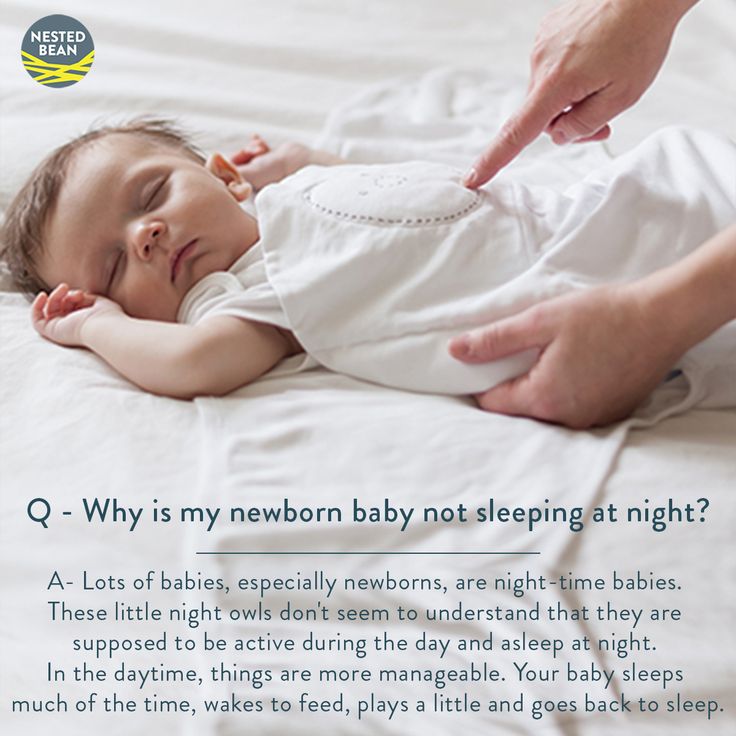 Both mother and child need them. What fruits with HB can a nursing mother? And is it true that strawberries and citrus fruits should be excluded from the daily diet? We will try to answer these in our article.
Both mother and child need them. What fruits with HB can a nursing mother? And is it true that strawberries and citrus fruits should be excluded from the daily diet? We will try to answer these in our article.
0-6 months
Article nine0003
Smoking while breastfeeding (HB): the impact on the baby
0 reviews
Tips and position on smoking while breastfeeding / smoking while breastfeeding from well-known international and Ukrainian pediatricians, WHO and La Leche League - a public organization to support breastfeeding women.
0-6 months
Article
Expressing Breast Milk: Top 5 Tips nine0039
0 reviews
The most natural and healthy food for a baby is and has always been breast milk. Its composition and properties are ideal for a small organism and not a single, even the most perfect artificial infant formula can replace this diet.
Its composition and properties are ideal for a small organism and not a single, even the most perfect artificial infant formula can replace this diet.
0-6 months
Article
Mastitis (breast inflammation): treatment, causes and symptoms nine0039
0 reviews
Breastfeeding is not always easy and women often face the problem of breast inflammation. Why does mastitis develop and how to recognize the first symptoms? And also let's figure out what can be done to prevent the disease.
0-6 months
Article
The correct start of breastfeeding is the key to a long and trouble-free lactation nine0039
Breastfeeding is a skill that absolutely every woman possesses at the level of reflexes. The problems faced by modern young mothers are much more often social and informational in nature, rather than physiological. Even a minimum of truthful information and self-confidence will help you start breastfeeding correctly and continue it for as long as your baby needs.
Even a minimum of truthful information and self-confidence will help you start breastfeeding correctly and continue it for as long as your baby needs.
0-6 months
Article nine0003
How to remove the stomach after childbirth: TOP 8 tips
0 reviews
A few proven methods to trim the belly after childbirth . Follow simple recommendations, and soon you will return to your figure, which was before pregnancy.
0-6 months
Article
Alcohol while breastfeeding (LB): can I drink it? nine0039
Breastfeeding is a process that has an extraordinary impact on the development and health of the baby. Since the relationship between the child and the mother is continuous, everything that has entered the body of a nursing mother will immediately end up in the baby's body.
Pregnancy
Article
breast milk oligosaccharides
Human milk oligosaccharides are one of the most enigmatic components whose functions scientists have recently discovered. Find out what oligosaccharides are and what benefits they bring to your baby. nine0003
0-6 months
Article
Infant diet
A baby's daily regimen and, first of all, his feeding regimen is the foundation of his health. How often should a baby be fed? How do you know if he has enough milk?
0-6 months
Article
Discharge after childbirth, or lochia: what a young mother needs to know nine0039
0 reviews
Lochia is a natural postpartum discharge. They appear immediately after the placenta has passed and last for several weeks until the lining of the uterus is completely healed. What do lochia look like at different stages, what is the norm, and in what cases should you sound the alarm? And is it possible to speed up postpartum recovery?
What do lochia look like at different stages, what is the norm, and in what cases should you sound the alarm? And is it possible to speed up postpartum recovery?
0-6 months
Article nine0003
Hair loss during breastfeeding (HB): what to do?
0 reviews
The problem of hair loss during lactation is quite common. This process is associated with a number of factors and is generally considered natural. Why does hair fall out after childbirth and how can I get rid of this problem? More on this later in the article.
0-6 months
Article nine0003
Artificial feeding of newborns: some tips
0 reviews
Mother's milk is the main source from which the tiny body receives nutrients and builds the foundation of immunity.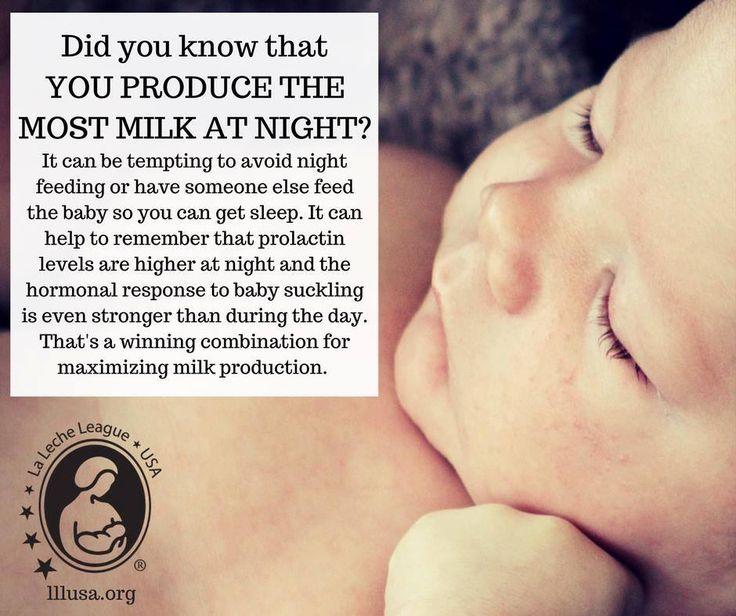 Therefore, breastfeeding is recommended by all pediatricians and neonatologists. This strengthens the bond with the mother and the immune system of the baby. However, it often happens that a young mother refuses breastfeeding. The reason for this may be a shortage or lack of milk or a doctor's recommendation. nine0003
Therefore, breastfeeding is recommended by all pediatricians and neonatologists. This strengthens the bond with the mother and the immune system of the baby. However, it often happens that a young mother refuses breastfeeding. The reason for this may be a shortage or lack of milk or a doctor's recommendation. nine0003
0-6 months
Article
Constipation after childbirth: what to do?
Intestinal dysfunction after childbirth is a problem that all new mothers face. This is not a pathology, but a completely normal, understandable and temporary state of the female body. Why there is constipation after childbirth, when bowel function is restored and what to do to eliminate discomfort - more on this later in the article.
nine0002 0-6 monthsArticle
Breastfeeding Pregnancy (HB): First Signs
0 reviews
Is it possible to get pregnant during lactation? There is an opinion that this is impossible.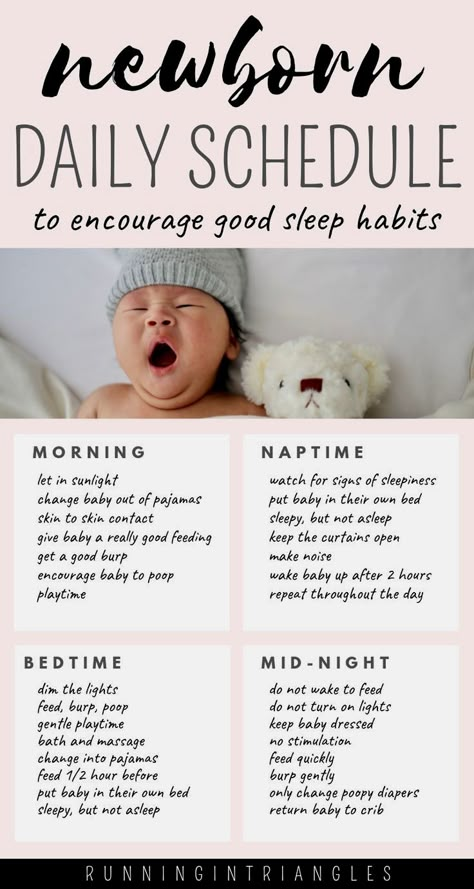 However, in practice, such cases are not uncommon. How to recognize the first signs of pregnancy while breastfeeding and what are the risks? More on this later in the article. nine0003
However, in practice, such cases are not uncommon. How to recognize the first signs of pregnancy while breastfeeding and what are the risks? More on this later in the article. nine0003
0-6 months
Article
How can I help my baby latch onto the nipple?
The key to a successful start to breastfeeding is the correct latch on of the nipple. Follow tips to help your baby latch onto the nipple and floor properly
0-6 months
Article
When can you have sex after giving birth? nine0039
0 reviews
The resumption of intimate relationships after childbirth is an ambiguous question. On the one hand, after such a long abstinence, you want to have sex as soon as possible, on the other hand, there are a number of nuances that prevent this. When you can have sex after childbirth and what precautions you should take - read further in the article.
When you can have sex after childbirth and what precautions you should take - read further in the article.
0-6 months
Article nine0003
Breastfeeding: the first steps after childbirth
Mothers usually start breastfeeding their newborn while still in the hospital. The physiology of the infant is well adapted to this. During the first feeding, the baby receives colostrum, which contains antibodies that fight infections.
Join the Club
We know that being a mother is not only unlimited happiness, but also a great responsibility. We will help you! nine0003
Register
Still haven't found what you need?
Try our new search.
Search
Should I feed my baby at night?
Restful sleep and nutrition
Each child has his own individual rhythm of sleep and nutrition, as well as an individual need for them. Just in newborns in the first weeks of life, the ability to distinguish between day and night has not yet been developed. The child is simply not used to going without food for a long time. Indeed, in the womb, he could satisfy hunger at any time of the day or night. Therefore, at least in the first weeks, he will certainly wake you up at night for feeding. nine0003
Just in newborns in the first weeks of life, the ability to distinguish between day and night has not yet been developed. The child is simply not used to going without food for a long time. Indeed, in the womb, he could satisfy hunger at any time of the day or night. Therefore, at least in the first weeks, he will certainly wake you up at night for feeding. nine0003
If you are formula feeding your baby, unload yourself and take turns with your partner for nightly feedings. It is also possible if you express milk in the evening and store it in the refrigerator (from +4°C to +6°C, closed for no more than 2 days).
After three months, the baby can go without food for longer, so he has a longer nighttime sleep than daytime. Starting at about 6 months, babies no longer need nighttime feedings, as at this age the rhythm of hunger and satiety in a healthy baby stops at daytime. nine0003
Before going to bed - milk porridge
Milk dessert with biscuits
Milk porridge at night is more satisfying than milk food.

